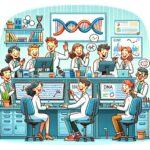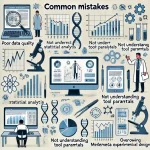
50 common questions asked for AI in drug discovery
April 24, 2024
How can AI be used in drug discovery?
- AI can be used in drug discovery to accelerate the identification and development of new drugs. It can analyze large datasets to identify potential drug candidates, predict their properties and interactions, and optimize their design.
What are the benefits of using AI in drug discovery?
- AI can speed up the drug discovery process, reduce costs, and increase the likelihood of success by enabling more efficient analysis and decision-making.
What types of AI are commonly used in drug discovery?
- Common types of AI used in drug discovery include machine learning, deep learning, natural language processing, and network analysis.
Can AI help in identifying new drug targets?
- Yes, AI can help in identifying new drug targets by analyzing biological data to identify molecules or pathways that are involved in disease processes and may be suitable targets for intervention.
How does AI accelerate the drug discovery process?
- AI accelerates the drug discovery process by automating and streamlining various tasks, such as analyzing large datasets, predicting drug properties, and optimizing drug design.
What are some successful examples of AI in drug discovery?
- Examples include the use of AI to discover new antibiotics, identify potential drug candidates for cancer treatment, and predict the efficacy of existing drugs for new indications.
What are the challenges of using AI in drug discovery?
- Challenges include the need for high-quality data, the complexity of biological systems, and the interpretability of AI models.
How can AI improve the efficiency of clinical trials?
- AI can improve the efficiency of clinical trials by identifying suitable patient populations, predicting outcomes, and optimizing trial design.
How does AI assist in predicting drug-drug interactions?
- AI can predict drug-drug interactions by analyzing drug properties and known interactions, as well as patient data.
What role does AI play in drug repurposing?
- AI can identify existing drugs that may be effective for new indications by analyzing their properties and known effects.
Can AI predict the toxicity of potential drugs?
- Yes, AI can predict the toxicity of potential drugs by analyzing their chemical structures and known toxic effects.
How does AI contribute to personalized medicine in drug discovery?
- AI can analyze patient data to identify personalized treatment options based on individual characteristics and disease profiles.
What are some AI tools and platforms used in drug discovery?
- Examples include IBM Watson for Drug Discovery, Atomwise, and BenevolentAI.
How does AI assist in analyzing large-scale omics data for drug discovery?
- AI can analyze omics data to identify patterns and associations that may be relevant to drug discovery, such as gene expression profiles or protein interactions.
What are the ethical implications of using AI in drug discovery?
- Ethical implications include issues related to data privacy, bias in AI algorithms, and the potential for AI to replace human judgment in decision-making.
How is AI used in natural product discovery for drug development?
- AI can analyze natural product databases to identify compounds with potential therapeutic effects, as well as predict their properties and interactions.
How does AI enable virtual screening of compounds for drug discovery?
- AI can simulate the interactions between molecules to predict their binding affinity and potential as drug candidates.
Can AI predict the pharmacokinetics and pharmacodynamics of drugs?
- Yes, AI can predict the pharmacokinetics and pharmacodynamics of drugs by analyzing their properties and known effects.
How does AI support target identification and validation in drug discovery?
- AI can analyze biological data to identify potential drug targets and validate their relevance to disease processes.
What are some AI-based approaches for drug design and optimization?
- AI-based approaches include generative models for designing novel compounds and optimization algorithms for improving drug properties.
How does AI improve the understanding of disease mechanisms for drug discovery?
- AI can analyze biological data to identify disease mechanisms and pathways that may be targeted for drug development.
What role does AI play in optimizing drug formulations?
- AI can analyze the properties of drugs and their interactions with formulations to optimize their delivery and efficacy.
How can AI be used to analyze and interpret biomedical literature for drug discovery?
- AI can analyze biomedical literature to extract relevant information and identify potential drug targets or interactions.
What are some challenges in integrating AI with traditional drug discovery methods?
- Challenges include the need for high-quality data, the complexity of biological systems, and the interpretability of AI models.
How does AI assist in identifying biomarkers for disease diagnosis and prognosis?
- AI can analyze patient data to identify biomarkers that are associated with disease diagnosis, prognosis, or treatment response.
Can AI help in identifying new uses for existing drugs?
- Yes, AI can analyze drug properties and known effects to identify new uses for existing drugs.
How does AI contribute to the discovery of new drug delivery systems?
- AI can analyze drug properties and interactions to design new drug delivery systems that improve efficacy and reduce side effects.
What are some key considerations for implementing AI in drug discovery?
- Key considerations include data quality, algorithm selection, and regulatory compliance.
How does AI enhance the process of lead compound identification?
- AI can analyze large datasets to identify lead compounds with desired properties for further development.
Can AI predict the efficacy of drug candidates?
- Yes, AI can predict the efficacy of drug candidates by analyzing their properties and known effects.
How does AI assist in optimizing drug dosages?
- AI can analyze patient data to optimize drug dosages based on individual characteristics and treatment responses.
What are some AI applications in natural language processing for drug discovery?
- AI applications include analyzing biomedical literature, extracting information from text, and predicting drug interactions or effects.
How does AI support the prediction of drug resistance mechanisms?
- AI can analyze biological data to predict how pathogens or cancer cells may develop resistance to drugs.
What are some AI-based approaches for drug repositioning?
- AI-based approaches include analyzing drug properties and known effects to identify new indications for existing drugs.
How does AI enable the identification of drug-drug interactions?
- AI can predict drug-drug interactions by analyzing drug properties and known interactions.
Can AI help in predicting the side effects of drugs?
- Yes, AI can predict the side effects of drugs by analyzing their properties and known effects.
How does AI assist in predicting the likelihood of drug candidates to succeed in clinical trials?
- AI can analyze drug properties and clinical trial data to predict the likelihood of success for drug candidates.
What role does AI play in optimizing the synthesis of drug candidates?
- AI can analyze chemical reactions and properties to optimize the synthesis of drug candidates.
How can AI be used to analyze and interpret imaging data for drug discovery?
- AI can analyze imaging data, such as MRI or CT scans, to identify biomarkers or disease characteristics relevant to drug discovery.
How does AI contribute to the identification of off-target effects of drugs?
- AI can analyze drug properties and interactions to predict off-target effects that may occur during treatment.
What are some AI-driven approaches for drug combination therapy?
- AI-driven approaches include analyzing drug properties and interactions to identify synergistic combinations for combination therapy.
How does AI support the prediction of drug metabolism pathways?
- AI can analyze drug properties and known metabolic pathways to predict how drugs are metabolized in the body.
Can AI assist in identifying patient populations that may benefit most from a particular drug?
- Yes, AI can analyze patient data to identify subpopulations that may benefit most from a particular drug based on their characteristics.
How does AI assist in the identification of new drug scaffolds?
- AI can analyze chemical structures to identify novel drug scaffolds that may have therapeutic potential.
What are some AI-based approaches for predicting drug-drug interactions?
- AI-based approaches include analyzing drug properties and known interactions to predict potential drug-drug interactions.
How does AI support the analysis of pharmacogenomics data for drug discovery?
- AI can analyze pharmacogenomics data to identify genetic factors that may influence drug response and efficacy.
What are some AI-driven approaches for optimizing drug manufacturing processes?
- AI-driven approaches include analyzing manufacturing data to optimize processes for producing drugs efficiently and safely.
How does AI contribute to the identification of drug candidates with reduced environmental impact?
- AI can analyze the environmental impact of drug candidates and suggest alternatives with lower environmental impact.
Can AI assist in predicting the long-term safety of drugs?
- Yes, AI can analyze long-term safety data to predict the potential risks of drugs over time.
How does AI contribute to the development of drug repurposing strategies?
- AI can analyze drug properties and known effects to identify new uses for existing drugs, speeding up the drug repurposing process.

















